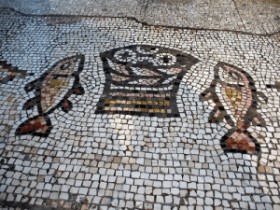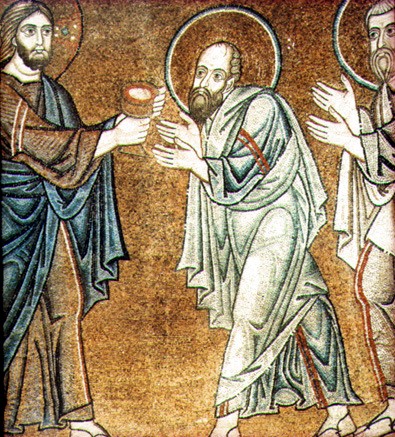Video Transcript: Unit 4 Lecture 1
UNIT 4 LECTURE 1
Those who found themselves in the difficult position of having to explain to the romans what the Christian faith was, found that they were faced with a hostile audience. The romans, from the start, looked upon the Christians as following a vile superstition. They were accused of various crimes such as incest and cannibalism. These charges were difficult to deny since the basis for them was found in the worship that went on in the early churches.
We saw earlier that the worship in the early church was based on the formula that was handed down to them by the Jewish synagogue. In what I am going to share with you now, we have the words of a man named Justin whom church history has come to know as Justin Martyr. He was accused of the crime of being a follower of Jesus, a man crucified by a Roman governor in Judea and who was now claimed to be alive. Christians worshipped this convict as God. Justin, in a letter handed down to us over the centuries, attempts to get his Roman judge to understand what goes on in the worship of the churches.

Chapter LXV.--Administration of the sacraments.
But we, after we have thus washed him who has been convinced and has assented to our teaching, bring him to the place where those who are called brethren are assembled, in order that we may offer hearty prayers in common for ourselves and for the baptized [illuminated] person, and for all others in every place, that we may be counted worthy, now that we have learned the truth, by our works also to be found good citizens and keepers of the commandments, so that we may be saved with an everlasting salvation. Having ended the prayers, we salute one another with a kiss.1908There is then brought to the president of the brethren1909bread and a cup of wine mixed with water; and he taking them, gives praise and glory to the Father of the universe, through the name of the Son and of the Holy Ghost, and offers thanks at considerable length for our being counted worthy to receive these things at His hands. And when he has concluded the prayers and thanksgivings, all the people present express their assent by saying Amen. This word Amen answers in the Hebrew language toγένοιτο[so be it]. And when the president has given thanks, and all the people have expressed their assent, those who are called by us deacons give to each of those present to partake of the bread and wine mixed with water over which the thanksgiving was pronounced, and to those who are absent they carry away a portion.
Chapter LXVI.--Of the Eucharist.
And this food is called among usΕὐχαριστία1910[the Eucharist], of which no one is allowed to partake but the man who believes that the things which we teach are true, and who has been washed with the washing that is for the remission of sins, and unto regeneration, and who is so living as Christ has enjoined.For not as common bread and common drink do we receive these; but in like manner as Jesus Christ our Saviour, having been made flesh by the Word of God, had both flesh and blood for our salvation, so likewise have we been taught that the food which is blessed by the prayer of His word, and from which our blood and flesh by transmutation are nourished, is the flesh and blood of that Jesus who was made flesh.1911 For the apostles, in the memoirs composed by them, which are called Gospels, have thus delivered unto us what was enjoined upon them; that Jesus took bread, and when He had given thanks, said, "This do ye in remembrance of Me,1912this is My body;” and that, after the same manner, having taken the cup and given thanks, He said, "This is My blood;” and gave it to them alone. .....
For the apostles, in the memoirs composed by them, which are called Gospels, have thus delivered unto us what was enjoined upon them; that Jesus took bread, and when He had given thanks, said, "This do ye in remembrance of Me,1912this is My body;” and that, after the same manner, having taken the cup and given thanks, He said, "This is My blood;” and gave it to them alone. .....
Chapter LXVII.--Weekly worship of the Christians.
And we afterwards continually remind each other of these things. And the wealthy among us help the needy; and we always keep together; and for all things wherewith we are supplied, we bless the Maker of all through His Son186Jesus Christ, and through the Holy Ghost.And on the day called Sunday,1913all who live in cities or in the country gather together to one place, and the memoirs of the apostles or the writings of the prophets are read, as long as time permits; then, when the reader has ceased, the president verbally instructs, and exhorts to the imitation of these good things.Then we all rise together and pray, and, as we before said, when our prayer is ended, bread and wine and water are brought, and the president in like manner offers prayers and thanksgivings, according to his ability,1914and the people assent, saying Amen; and there is a distribution to each, and a participation of that over which thanks have been given,1915and to those who are absent a portion is sent by the deacons. And they who are well to do, and willing, give what each thinks fit; and what is collected is deposited with the president, who succours the orphans and widows and those who, through sickness or any other cause, are in want, and those who are in bonds and the strangers sojourning among us, and in a word takes care of all who are in need. But Sunday is the day on which we all hold our common assembly, because it is the first day on which God, having wrought a change in the darkness and matter, made the world; and Jesus Christ our Saviour on the same day rose from the dead. For He was crucified on the day before that of Saturn (Saturday); and on the day after that of Saturn, which is the day of the Sun, having appeared to His apostles and disciples, He taught them these things, which we have submitted to you also for your consideration
Chapter LXVIII.--Conclusion.
And if these things seem to you to be reasonable and true, honour them; but if they seem nonsensical, despise them as nonsense, and do not decree death against those who have done no wrong, as you would against enemies. For we forewarn you, that you shall not escape the coming judgment of God, if you continue in your injustice; and we ourselves will invite you to do that which is pleasing to God. And though from the letter of the greatest and most illustrious Emperor Adrian, your father, we could demand that you order judgment to be given as we have desired, yet we have made this appeal and explanation, not on the ground of Adrian's decision, but because we know that what we ask is just.
That is Ignatius writing to the emperor to defend the faith. It was about in the year 110 that he was writing.
